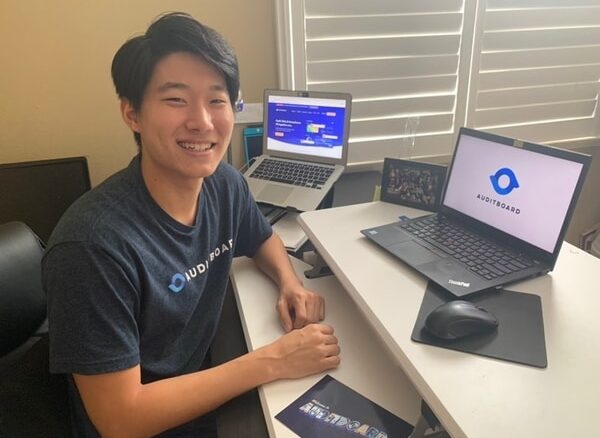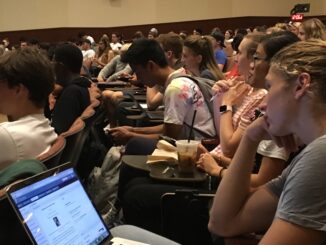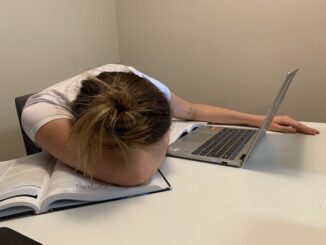
Incoming first-year student Blue Brasher chose Pepperdine for its Pacific Ocean views and academic prestige.
But instead of starting her college journey this fall, Brasher is currently living in her hometown of Fayetteville, Arkansas, and operating her own food truck business: Killer Cereal.
“I picked Pepperdine for a lot of reasons but a lot of it was the campus and the culture of the campus,” Brasher said. “One of the things I was really excited about was the teachers and how they connect with the students and how they really care. I just didn’t feel like I’d get that experience doing online classes.”
Seaver College enrollment this fall is down roughly 300 students from Fall 2019. The college saw 85 students start the semester and then decide to take a leave of absence by the fifth-week census. For those students, several weeks of online school was enough to alter their Fall 2020 plans.
Students interviewed said they considered several factors before withdrawing, including the difficulties of online classes, financial hardships and their motivation levels. Although students seem to be enjoying other activities during their semester off, the university is facing difficulties as it has lost significant tuition and housing revenue compared to a normal fall semester.
“I want to study but … ”
Without room and board fees, the total cost of attendance for students living at home this semester is $16,160 cheaper compared to Fall 2019. However, the flat-rate tuition of $28,875 per semester has stayed the same. Some students decided online classes were not worth the money.
“Pepperdine online was just way too expensive and I didn’t want to do labs online,” sophomore biology major Bella Poblete said. “It was difficult taking online classes [last semester] because I feel like I learn better inside of a classroom.”
Brody Stejskal, a senior international business and marketing double major, also said he did not want to spend the same amount of tuition for remote learning.
“I didn’t think it was quite worth it because going online, the price tag didn’t really match up,” Stejskal said.
Seaver College Dean Michael Feltner defended the tuition cost and the value of a Pepperdine education in an email to students July 22.
“The cost of delivering Seaver College’s premium academic experience arises from its small class sizes, outstanding faculty, and robust support services,” Feltner wrote.
The importance of studying in Malibu
Alongside with the value of academics, not being able to physically be present on the Malibu campus played a huge role for students who decided to make alternative plans.
“I already experienced online classes for two months after coming back from Shanghai and so I had the experience of online classes and how we all know that you get tired easily like zoom fatigue and stuff like that,” James Yi, junior business administration major, said. “I was just like, ‘Do I want another semester of online classes?’”
Yi was one of the 2019-20 Shanghai International Programs participants whose abroad experience came to an abrupt end following the outbreak of COVID-19. After relocating to Malibu for a month, Yi was yet again sent back to his permanent residence in Orange County as the university closed its campus for safety measures.
Yi’s initial plan was to graduate a semester early and start working as soon as possible. After speaking to his friends, who have also considered taking a semester off, he spent two weeks contemplating his decision, as well as a backup plan.
He made up his mind to take a gap semester after receiving an internship offer at Auditboard, and because he was scheduled to graduate a semester early in December 2021, so he had an extra semester to spend without having to change his graduation year.
“If the whole junior year is online, then that means I only have a semester left in Malibu, which isn’t fun you know,” Yi said.
Stejskal said one of the factors that determined his decision was not being able to be on campus.
“I’m going to school for networking purposes and education is almost secondary,” Stejskal said. “I’m not going to be getting a great education online and something that is sustainable.”
The university’s support system
Andrea Harris, senior director at Student Administrative Services, said Pepperdine policy allows students to take up to four semesters of absence before having to go through the readmission process. Those who deferred admission prior to taking classes can start their education at Pepperdine whenever they want.
“I don’t want people to put off their plans for their lives because of something that’s affecting the entire world,” Harris said.
All four students interviewed said Pepperdine was supportive of their decisions to withdraw.
Yi said he received prompt communications from OneStop and the Financial Aid office regarding his financial aids package, which lifted some weight off his shoulders.
“OneStop and the Financial Aid office are both great,” Yi said. “They answered my questions and the process was really smooth.”
Poblete also found OneStop very supportive of her decisions to take community college courses to fulfill her GE requirements.
“They didn’t pressure me to stay with Pepperdine,” Poblete said. “They actually let me know if I had questions or concerns or any problems to let them know.”
Harris said OneStop is contacting students taking a gap semester through emails and providing important information such as on January and spring class registration.
“We understand that online is not for everybody,” Harris said. “We’ll do our best. Staff across the university are available at hours that they’ve never been available before.”
In order to welcome students back to Malibu as soon as possible, Chris Heard, director of the Center for Teaching Excellence and a religion professor, is helping professors prepare for a potential hybrid approach for Spring 2021 should situations get better.
“While we are waiting for the vaccines, myself and my faculty colleagues are doing whatever we can to make our courses as accessible as possible to students,” Heard said.
Students taking on different opportunities
In more precedented times, students might take a leave of absence to travel internationally or pursue an internship opportunity in more traditional office settings. In the age of COVID, however, students are finding a range of activities to fill their time.
Stejskal has been focusing on the management of his own marketing company, MedxMarketing, which provides social media ads and strategy plans for the healthcare industry. He decided to take the fall off after experiencing a stressful online class setting last spring.
Stejskal said he is treating this time like a workation.
“I would say compared to my friends, I feel like I am having a much better time,” Stejskal said. “It definitely is a lot less stressful and it sounds like a lot of my friends have been getting a lot more amount of work than they had expected.”
Stejskal said not being at school has allowed him to actually enjoy writing. He is currently spending a lot of time writing about what he is passionate about instead of being assigned to write an essay about something he is not interested in.
Brasher is also taking this time to allocate more time for her passions. After releasing her debut album June 29, Brasher has been preparing for her second album and interning for Tyson Foods to market and advocate for a more sustainable environment.
“What’s cool is I don’t have school right now so I really can just delve into all the projects I want to do, and that’s been really fun,” Brasher said.
As a part of her food truck business, which she started because she loves cereal, Brasher said she recently had an opportunity to talk to elementary school students about her entrepreneurship. There, she talked about how she was able to turn her love for cereals into a business that she enjoys, and donated some of her cereals.
Brasher said she enjoys sharing these precious moments with children in her city.
Staying connected with Pepperdine
Despite not seeing Pepperdine friends on a daily basis, students are also finding ways to stay connected with the community.
To encourage student involvement and continuous connection, Inter-Club Council has been sending out emails every month highlighting which clubs are hosting meetings and other activities.
“It’s still good to continue that community aspect into this really hard digital community setting,” Yi said.
Yi has been attending Koinonia Campus Ministry (KCM) meetings and has recently joined the Investment Club to learn more about the world of finances. Yi said he appreciates Pepperdine for the opportunity to stay connected with both old and new communities.
Similar to Yi, Poblete is finding ways to stay connected with her community such as KCM and PASA, the Pilipino-American Student Association.
Returning to Malibu
Students taking a temporary pause from their academics said they will eventually return to Pepperdine. Yi plans to return in spring, and hopes it is on campus, even if there are strict COVID-19 regulations such as social distancing protocols and mask mandate rules.
“I would definitely still continue my education because right now I’m set to graduate on time,” Yi said. “If I took another semester off, then I’ll have to stay another semester so that doesn’t seem the case for me.”
Poblete’s plan for the spring is to attend the Shanghai program. If that does not work out, she is hoping to return to Malibu to continue her biology degree.
“I will definitely go back and hopefully have those in-class labs,” Poblete said. “I feel like that’s really vital to my experience with my major.”
Currently taking a gap year, Brasher is set on taking classes next academic year, whether that be online or not, to make a start of her college career.
“In the case the school is online next year, I will probably just do it online,” Brasher said. “I do want to get my degree at some point.”
A leave of absence is not an option for everyone
Roughly 90% of gap year students return to college within a year of taking a break, according to the Gap Year Association’s research. However, that figure may look different this year as everything is unpredictable under the current circumstances.
During the COVID-19 pandemic, students should have clear goals in mind that will advance their careers and long-term life plans, otherwise it is best for students to stay in school, Evan Thompson wrote in a June 2 thebestschool.org article.
A delay in finishing one’s degree has an impact on post-college earnings, reducing earnings as much 8 to 15%, Dirk Witteveen and Paul Attewell wrote in a January 2019 “Research in Higher Education.” To put that into perspective, the average starting salary for college graduates is estimated to be around $50,000.
Taking a leave of absence grants students extra time to work on their personal projects, however, not all students are able to benefit from or even have the option to take a gap semester, Chris Quintana wrote in a May 17 USA Today article.
For first-generation and low-income students, the future was often precarious before the coronavirus outbreak, Quintana wrote.
If those students drop out, they are often saddled with thousands of dollars in debt but without the long-term earnings benefits from a college degree to help them pay it off.
Roughly 18% of the Seaver College population is first-generation, according to the Student Success Center website.
Pepperdine is facing significant loss in tuition revenue
The number of students taking a leave of absence is a huge financial loss for the university. Seaver College has lost tuition dollars with the lower enrollment numbers, and with campus mostly closed, the college is losing revenue in Housing and Residential Life and International Programs.
“The housing revenue and the International Program revenue, both of those are significant,” Harris said.
HRL collects an estimate of $12.4 million for first-year suite style housing alone every year. This year, that number is a zero. Similarly, with the university suspending all abroad locations, IP is in a financially difficult position.
Although a Graphic survey revealed that about 50% of the 66 students polled felt that the school was prioritizing finances over students, the loss of revenue can have major implications for the university.
“Pepperdine is now facing somewhere between $60 million to $80 million budget short falls this fiscal year,” President Jim Gash said in his President’s Briefing Aug. 11.
Professors are also facing significant challenges as the university temporarily suspended the 6% employer matching contribution to Pepperdine’s retirement plan. Gash said this change leads to a total of $6.9 million bite out of the budget deficit that the university is facing this fiscal year. This is one of many cuts that Pepperdine is temporarily making to optimize fair educational opportunities for all students.
Without a doubt, the unexpected outbreak of the global pandemic has altered everyone’s plans, whether they be positive or not.
“I think it’s a real exercise in developing resilience and skills, just to survive and to flourish even under conditions that are not optimal for you,” Harris said.
Sawa Yamakawa completed the reporting for this story in Jour 241 in Fall 2021 under the supervision of Dr. Christina Littlefield and Dr. Theresa de los Santos. Dr. Littlefield supervised the web version of the story.




